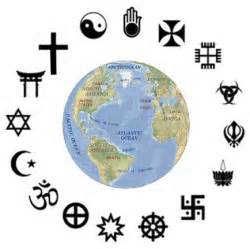Religion Trumps Science?

Science trumps religion? Which comes first, science or religion? Which will outlast the other? Many- if not most – literate moderns would say that religion was just the product of a certain stage of human evolution, and that we have outgrown it in this “New Age” of reason and digitization.(This excerpt of the review of evolutionary biologist Dominic Johnson’s book God Is Watching You is taken from “Religion May Be Part of Human Nature, But Why?”, originally published at mosaicmagazine.com)
But wait a minute! Are we sure of this? Is there something “hard-wired” into us that makes religion and religiosity something permanent rather than just part of the ephemera of human progress? In this review/discussion of Dominic Johnson’s God Is Watching You Lawrence Klepp agrees with the author’s contention that we will never outgrew religion and our need for same.
“In Johnson’s view, . . . [the] old or new atheist vision of modernity—a scientifically guided, religion-free world—is a mirage. Science can study religion, accommodate it, explain things without it, but not replace it: “The human mind,” in the words of Edward O. Wilson, “evolved to believe in gods. It did not evolve to believe in biology.”
So far, so good. But I suspect that what fundamentalism has in common with modern Utopian and ultra-nationalist political movements and with New Age mystiques and quasi-religious practices like meditation and vegetarianism is a quest for purity, not a yen for supernatural punishment. Modernity is complex, confused, urban, erotic, anxious: in its neon-lit light, ancient pieties can look pure. The same goes for peasants, primeval nature, primitive tribes, Tibetan Buddhists, and ethereal diets. Or radiant, rational, religion-free futures.
So I think Johnson oversells his wrathful gods. Even in terms of social utility, as enforcers of human cooperation, they may not be indispensable and they can be counterproductive. He admits that the pagan Greek and Roman gods, who were capricious and of doubtful moral character themselves, had virtually no bearing on the virtue of their worshippers. A sense of tradition, civic duty, honor, and shame sufficed to keep most people in line. The same can be said of many other societies, ancient and modern. . . .
In any case, even as a backhanded, evolutionary endorsement of religion, this book, with its stress on supernatural surveillance and retribution, won’t please most believers, who are moved by other things that faith offers: a sense of transcendence, a feeling of reconciliation with nature and God and others, communion, and compassion. And, at least, a strong hint of cosmic truth.”
..read this book review in its entirety
